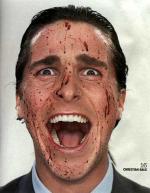I found a rather intriguing quote in this book I am reading. I wanted to share it:
"In Western films the self must above all be silent and self-sufficient, but capable of exploding into brutal murder while maintaining a disarming smile. The Western hero, in fact, provides the best proof that sustaining a convincing self is the basis for enhancing cultural meaning*. With nothing but penatrating eyes, charged silence, and an IQ of 80, why does this character thrill audiences to the core? The Western hero conveys little more - but nothing less - than unshakable conviction that underneath it all there is genuine meaning in man's action."
Do you agree or disagree, why?
*I believe when Ernest discusses the murderous man, he doesn't state that the West places significance on murder, but rather on the overwhelming conviction portrayed by the actor, regardless of what acts one commits. The actor focuses on a seemingly infallible sense of self that cannot be suppressed by any entity outside itself.
"In Western films the self must above all be silent and self-sufficient, but capable of exploding into brutal murder while maintaining a disarming smile. The Western hero, in fact, provides the best proof that sustaining a convincing self is the basis for enhancing cultural meaning*. With nothing but penatrating eyes, charged silence, and an IQ of 80, why does this character thrill audiences to the core? The Western hero conveys little more - but nothing less - than unshakable conviction that underneath it all there is genuine meaning in man's action."
Do you agree or disagree, why?
*I believe when Ernest discusses the murderous man, he doesn't state that the West places significance on murder, but rather on the overwhelming conviction portrayed by the actor, regardless of what acts one commits. The actor focuses on a seemingly infallible sense of self that cannot be suppressed by any entity outside itself.
Last edited:


